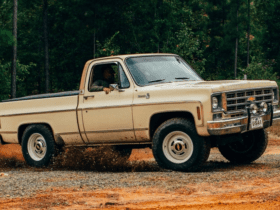The ongoing Trans-Pacific Partnership trade talks got a boost this week after President Obama made a visit to Japan. If you haven’t heard about this new trade discussion, you’re not alone. It’s not exactly setting the world on fire like missing Malaysian airliners or anti-government cattle ranchers.
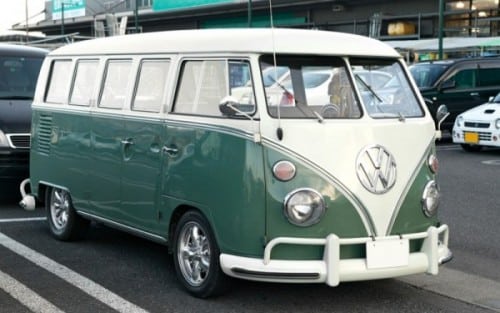
This sales success of the VW Bus caused the Chicken Tax to come into existence.
However, the ramifications of this trade pact could fundamentally shake up the truck market and the entire automotive world. Here is what you need to know.
For the past several years, negotiators have been working on a Trans-Pacific Partnership (TPP). This trade pact involves 12 nations: Australia, Canada, Chile, Japan, Malaysia, Mexico, New Zealand, Peru, Singapore, the United States, and Vietnam. These countries amount for about 40 percent of the world economy. Trade negotiators have cemented several pieces in place, yet there are still some obstacles between Japan and the U.S…namely, the “Chicken Tax.”
What’s a Chicken Tax, And Why Do I Care?
Since the 1960s, the U.S. has imposed a 25 percent tariff on light truck imports known as the “Chicken Tax.” Created to both thwart the imports of VW trucks and buses and protect the US chicken farmer, the tariff has largely been “de-beaked” save for the 25% tariff on imported trucks (see this article for nitty-gritty details).
This truck tariff has limited automakers in a variety of ways:
- VW’s Amarok, a globally competitive compact pickup truck, is not available in the USA due to this tariff
- Ford’s TransitConnect (built in Turkey) may not be available in the US much longer if the Chicken Tax isn’t lifted
- At various points, Mitsubishi, Subaru, GM, Scion, Hyundai, and a half a dozen automakers most people have never heard of (like Mahindra, Great Wall, and Geely) have discussed selling a compact truck in the USA, only to cite the chicken tax as an insurmountable obstacle.
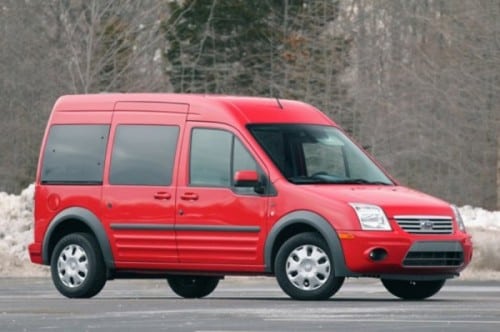
Ford got their hands slapped after skirting the Chicken Tax by importing the “passenger” Transit Connect van and then stripping out the seats to make it a cargo van.
Today, most automakers see the Chicken Tax as bad for business. While the tariff would seem to only impact companies that build trucks overseas, domestic automaker Ford and psuedo-domestic automaker Fiat Chrysler have both suffered as a result of this regulation. According the a report from the CATO Institute, the Chicken Tax is a “policy in search of a rationale.”
What Happens If the Chicken Tax Is Dropped?
For the sake of argument, let’s say the Chicken Tax is dropped. Here’s how automakers may respond:
VOLKSWAGEN
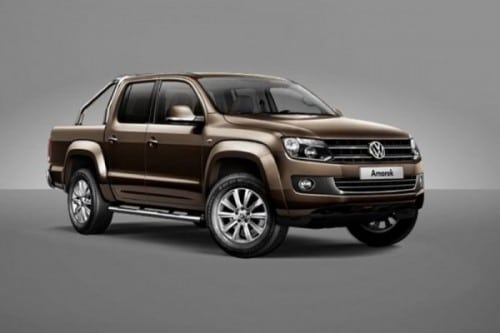
A hot topic with VW lately has been the Chicken Tax and what it could mean for the Amarok.
VW might find a way to import their Amarok and/or a smaller truck to the U.S. For the past several months/years, VW has been talking about the Chicken Tax as THE reason why it hasn’t brought a new truck to the U.S. market. And VW has been talking for years about its desire to grow market share. It is pretty likely a VW pickup HAS to be a key part of their plan to grow market share. With limited production facilities in the U.S., the cost of a U.S. built truck is astronomical. Importing one with the 25 percent tariff? The business case for that is a LOT better.
SCION
Ever since a Scion truck concept debuted at the 2009 Specialty Equipment Manufacturers Association show, Scion has been hammered with questions about a production model. The answer is always the same according to Scion Vice President Doug Murtha.
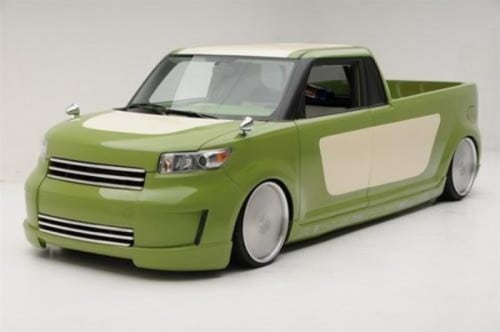
Scion has faced repeated questions about a pickup after different concepts were brought to SEMA.
He told me at the New York International Auto Show it is a two-fold problem. First, the Chicken Tax creates an obstacle for importing a truck to the U.S. Second, Scion would need to scale production to around 100,000 units to be profitable. The need to scale is why they can’t build it in the U.S. Toyota simply doesn’t have the production capacity room to add that much scale.
Toyota does have additional production capacity worldwide and it is foreseeable they could shift production around and create capacity for a Scion pickup. If the Chicken Tax goes away, don’t be surprised to see that happen.
GENERAL MOTORS
GM currently produces the Chevy Colorado in both Thailand and Brazil. While neither of these countries is part of the trade partnership group, these countries have free trade agreements with other nations. Basically, GM could export the Colorado from Thailand to Malaysia, modify it, and then re-export it to the USA tariff-free. While it’s hard to imagine this happening right away (GM has adequate capacity in the USA for the Colorado and GMC Canyon), if sales heated up, GM might find importing the truck financially viable.
FORD
This one is easy. If mid-size trucks see a rebirth, Ford could look to bring the Global Ranger back to the U.S. While Ford’s official reasons for canceling the Ranger are that a) it mostly competed with Ford’s own F-150 and b) it occupied valuable production capacity, the reality is that Ford makes substantially more money on their larger trucks than they ever did on the Ranger. If they could import Rangers from overseas (where production costs are lower), the business case for selling the Ranger would improve.
CHRYSLER
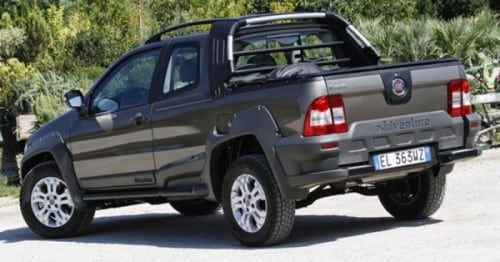
The Fiat Strada could come to the U.S. if the Chicken Tax is dropped.
It is pretty unforeseeable that Chrysler would find a way to bring back the Dakota. However, Fiat has a Strada pickup that would fill mid-size truck role for Chrysler. Fiat already imports vehicles to the U.S. and would just need to find a production facility/loophole to import trucks through the 12-nation TPP pact.
TOYOTA
Right now, Toyota has maximized their production capacity at their plant in San Antonio, Texas. This plant produces both the Tacoma and Tundra trucks. Without a Chicken Tax, Toyota could decide to move production of the Tacoma to Japan. This would free up capacity for them to expand their Tundra production – the more profitable truck. Also, the Tacoma could share a platform with the Hi-Lux that would create cost savings for them. In other words, it is a win-win for Toyota.
There are also a ton of other possibilities from a pool of niche manufactures. These manufactures could also shake up the market by introducing unique products. Also, they would reduce the market share and profits from the larger makers.
In the end, not having a Chicken Tax could substantially hurt some manufactures while causing a boon for others. Like most things in life, there isn’t a simple answer. Now, TPP negotiators say they want a deal done by the end of the year. Whether we like it or not, the answer will be here before we know it.







